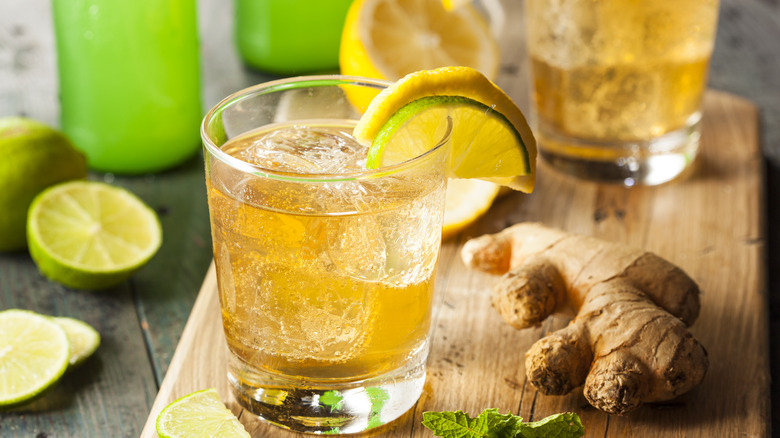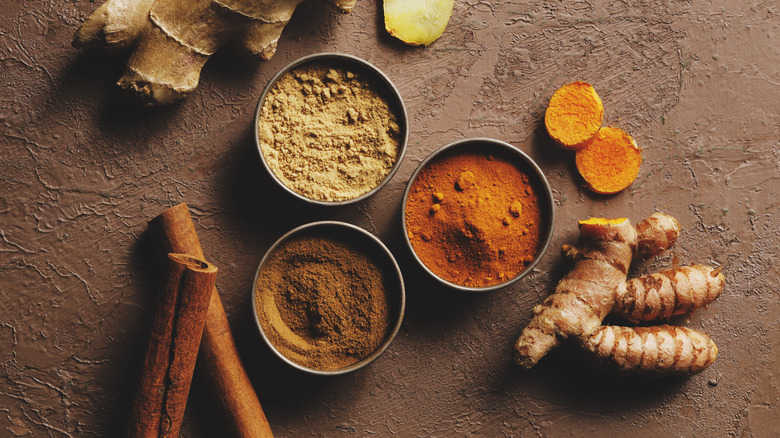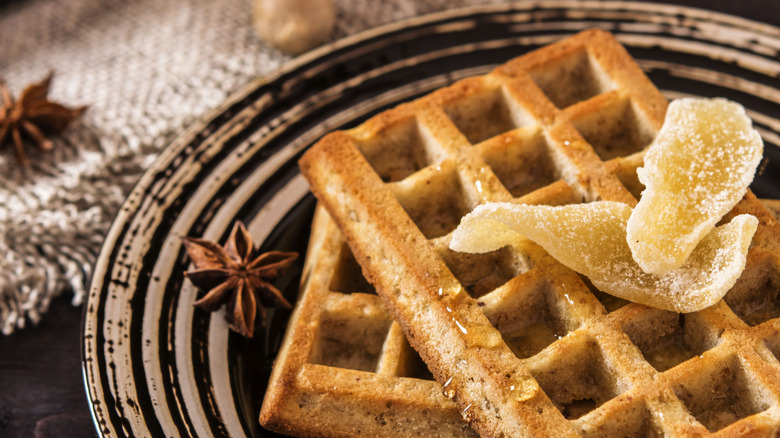Ginger Wine Is A Refreshing Drink With Endless Possibilities
Nothing is better than a drink with the popularity and versatility to achieve year-round drinkability. It must be equally refreshing, warming, and bracing, as well as have flavors that are able to span across the changing seasons. While few beverages meet this mark, ginger wine, a drink that is popular in East India, does so easily, with its bold flavor and impressive potential health benefits. This ginger wine is a sweet and spicy drink that originated in India in the early 1900s and was made popular by a rare cookbook edition called "The East Indian Cookery Book."
Contrary to its name, it contains absolutely no alcohol. It is believed that the common home-brewed version came about as a result of copycat recipes that were attempting to emulate a temperance soft drink from the era. The branded drink was called O.T., and as such the homemade beverage is sometimes referred to by the same name, or it's called ginger pop. In addition to tasting great, the drink purports to have a variety of medicinal effects — a claim which its loyal fans seem to confirm with abundant anecdotal evidence.
What is ginger wine and how is it made?
O.T. ginger wine is distinct from the westernized homemade wines you may be familiar with that use ginger fermented with raisins and sugar to produce an alcoholic beverage. Instead, this drink is a heady blend of fresh ginger, sugar, chilies, lime, water, and a host of spices including cinnamon, cardamom, and cloves. Different households have their own quirks and order of operations when it comes to putting these ingredients together, but the general recipe is as follows: First, heat the sugar in a pan until golden brown and caramelized. Next, add the water, ginger, lime juice, and spices. Bring to a boil, then reduce the temperature and allow the brew to steep at a simmer until the desired flavor and consistency is reached.
Once ready, strain the solids from the beverage and serve once it has cooled completely. The resulting tonic tastes sweet and tangy, yet spicy and warming. The intensity of these flavors will fluctuate given the preferences of the cook, so your drinking experience will vary depending on where you enjoy it and by whom it is made.
How to use ginger wine
This ginger wine is, by nature, a little bit thicker and more syrupy than other drinks due do the inclusion of caramelized sugar. As a result, while many enjoy it on its own, it is perfectly acceptable to cut it with seltzers or sodas like ginger ale, in order to thin it out and add carbonation. Another option some choose, in an ironic twist on its temperance-related roots, is to enjoy it as a mixer with their alcoholic spirit of choice to create a cocktail — gin and brandy are popular options.
You can use its viscosity to your advantage. In addition to sipping ginger wine, you can also drizzle it, spread it, and stir it into a wide variety of appetizers, main dishes, and desserts. Try serving it as a syrup to top off a bowl of ice cream or a plate of seasonally-spiced gingerbread waffles. Use ginger wine as a creative swap to fill the inside of cinnamon rolls and coffee cake. You can even add it to savory foods, thanks to its spicy tang — experiment with adding it to your next charcuterie board to bring out new flavors in your favorite meats and cheeses.
The health benefits of ginger wine
One of the major reasons for this drink's popularity is its use as a medicinal supplement. Since its invention, unfermented homemade ginger wine has been touted for its ability to ease indigestion, stave off colds, and soothe sore throats. Though the specific drink recipe has not been scientifically studied, these claims have been backed up by word-of-mouth for many years.
Looking at the ingredients present in the concoction, it is very possible that the drink does in fact achieve some of these effects. Ginger, in particular, has been shown to fight all of the above ailments with its powerful anti-inflammatory properties. Limes and cinnamon also contain anti-inflammatory compounds, while hot peppers and cloves have antimicrobial properties that inhibit bacterial growth. As such, the science behind these beliefs is pretty sound, and this — along with the real-life experiences of those who have appreciated the drink for generations — makes it a safe bet that enjoying ginger wine could bring you genuine relief if you are feeling under the weather.



